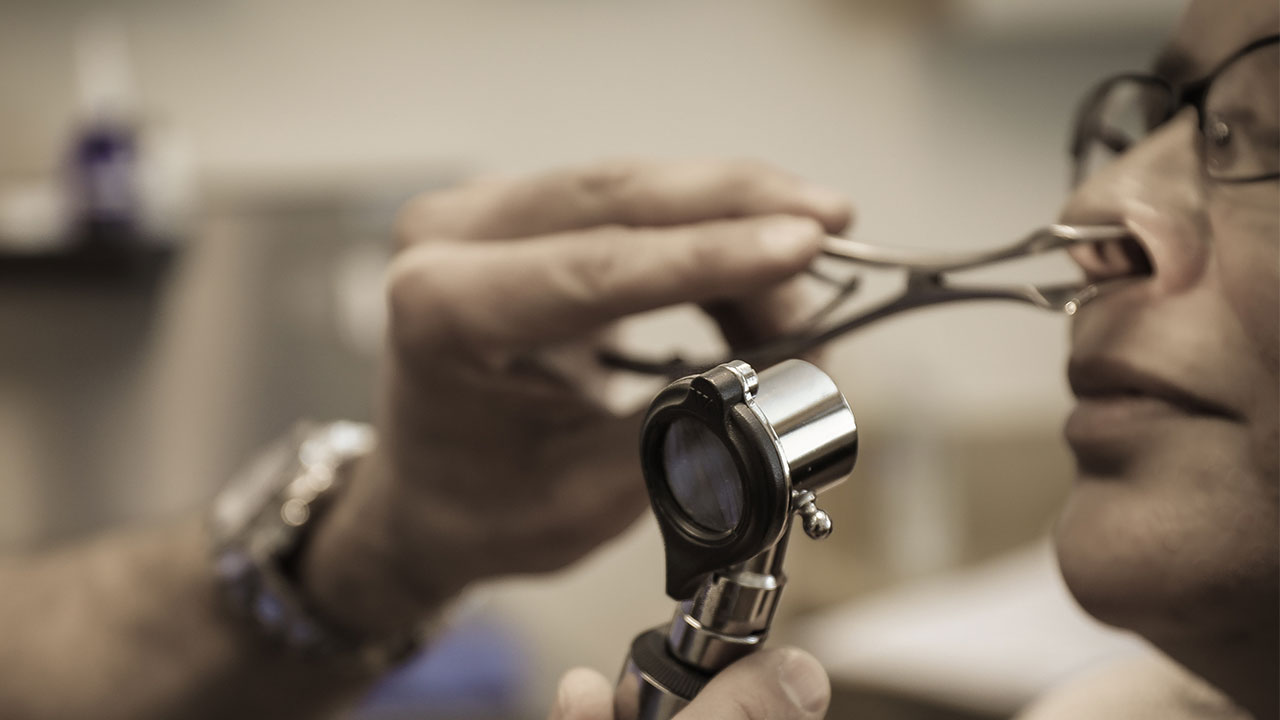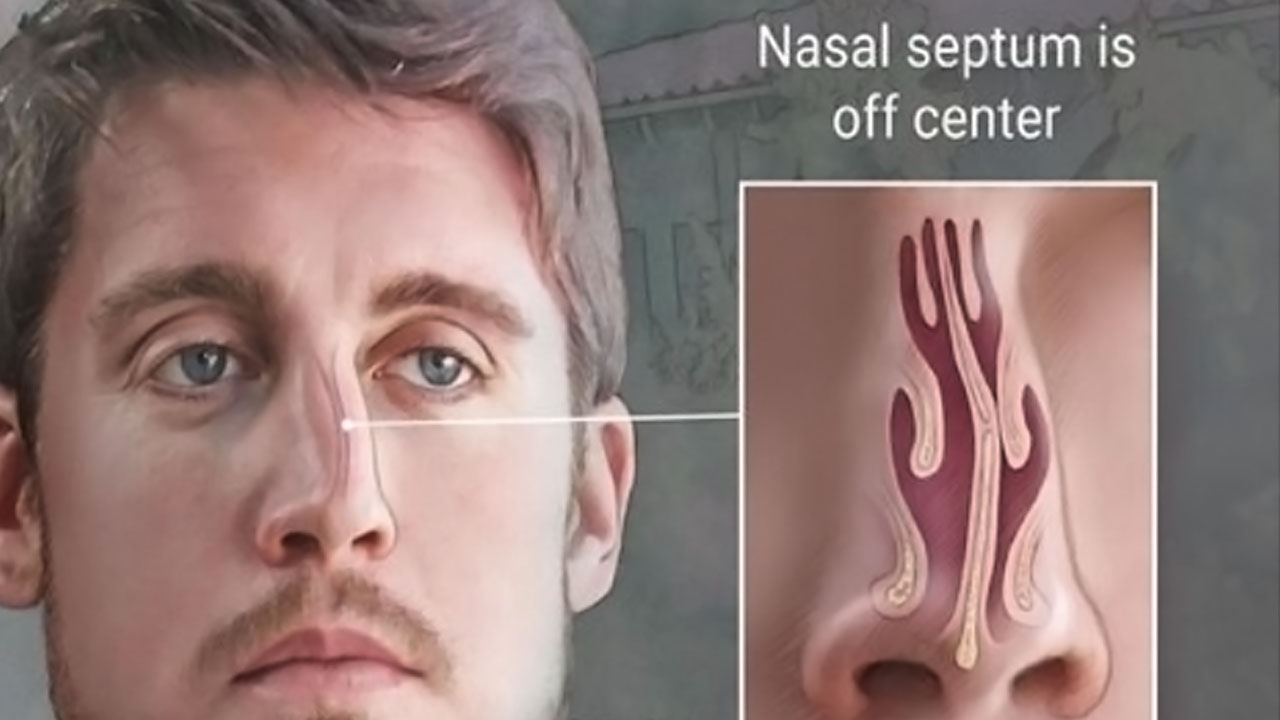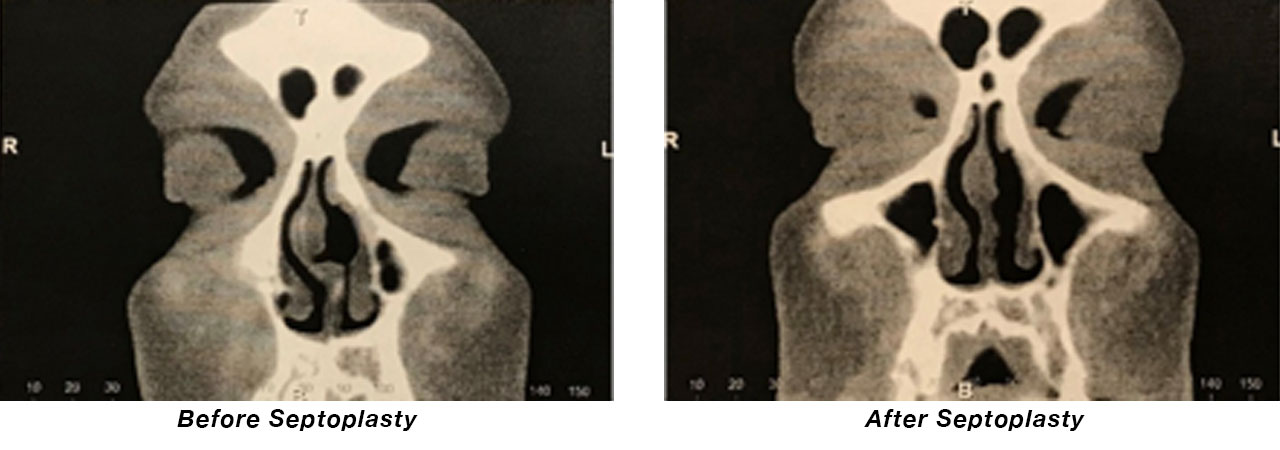
What is Deviated Septum Surgery?
If you have difficulty breathing through your nose, you may have a deviated septum. The nasal septum is the midline portion of the nose that separates the right and left air passages of the nose. The septum is a thin wall of bone and cartilage that may be displaced to one side making that nasal passage smaller. Septal deviations are easily diagnosed by an Otolaryngologist and can be seen on CT scan.
What are symptoms of a deviated septum?
Patients with a deviated septum will typically notice nasal congestion, postnasal drip, nasal obstruction, “allergies”, mouth breathing, dry mouth upon awakening, and snoring. These patients are also at increased risk for sleep apnea and sinusitis.
How do you get a deviated septum?
It is rare for a child to have a deviated septum, but it is estimated that 80% of the adult population has some degree of septal deviation. The condition is only significant if it causes nasal congestion or nasal obstruction. Most people have a septal deviation for genetic reasons – the septum was genetically programmed to grow crooked around the time of puberty. A small percentage of people have a septal deviation due to nasal trauma, often associated with a broken nose.

Can a deviated septum be corrected without surgery?
Although some forms of nasal congestion can be improved non-surgically, a symptomatic septal deviation can only be corrected with a minor surgical procedure.
What other procedures might be performed with a septoplasty?
Many patients that undergo deviated septum surgery will also have a turbinate reduction. Turbinates are the tissues in the nose that respond to allergies. These tissues can swell and contribute to nasal obstruction. Some patients will have minimal sinus surgery, or balloon sinuplasty performed during their procedure to resolve sinus pressure and sinus infections. Finally, a nose job, or rhinoplasty could be performed at the same time to change the cosmetic appearance of the nose.

How is deviated septum surgery performed?
Surgery to correct a deviated septum, or septoplasty, is performed by an Ear, Nose, and Throat specialist. The surgical procedure is often performed in the operating room under sedation or general anesthesia. Highly experienced nasal surgeons will perform septoplasty in the clinic procedure room. After a gentle sedation, numbing medication is injected into the septum. The deviated bone and cartilage are adjusted to straighten the septum which opens the nasal passages. The surgical site is closed with 2 small sutures. Although nasal packing was used in the past, there is no need for nasal packing in this day and age. The procedure typically takes less than 30 minutes.
What is the recovery like from a septoplasty?
Recovery from a septoplasty should be quite easy. There are no external incisions, external swelling, or external bruising. Everything is performed on the inside of the nose. Since nasal packing is no longer necessary, there is minimal pain or discomfort associated with this surgery. Most patients take acetaminophen or ibuprofen. Narcotics are not necessary. A small amount of nasal congestion and nasal discharge should be expected for the first 48 hours. Patients are typically back to normal activities within 72 hours.
What are the risks of deviated septum surgery?
Septoplasty is a very common and very safe procedure. There is a small risk of bleeding which is easily resolved with minor intervention. Rare complications such as scarring, infection, or septal perforation are virtually unheard of in experienced hands.
What are the success rates of septoplasty?
Septoplasty is a common procedure with high success rates and low complication rates. Resolution of nasal obstruction and nasal congestion should be expected in over 95% of cases when an experienced surgeon is involved. With such high success rates, revision surgery is rare.
How much does deviated septum surgery cost?
Septoplasty is covered by all commercial insurances and Medicare. If you do not have insurance, the expected cost for surgery is about $1500 if performed in a clinic procedure room. The cost can be significantly higher if a hospital operating room suite is required.
Should I undergo a septoplasty?
If you have a long history of nasal congestion, nasal obstruction, mouth breathing at night, and a diagnosis of septal deviation, you should seriously consider septoplasty. This condition is not improved with medications. In experienced hands, the procedure is simple and effective. Most patients note that the septoplasty was easier than expected and more beneficial than anticipated.
